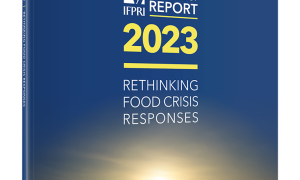لقد واجه العالم الكثير من الازمات خلال عام 2022.
Search
En 2022, el mundo se enfrentó a múltiples crisis.
En 2022, le monde a subi des crises multiples.
2022年,世界面临多重危机。旷日持久的2019冠状病毒病疫情(COVID-19)、重大自然灾害、内乱和政治动荡以及气候变化日益严重的影响对食物系统的破坏仍在继续,而与此同时,俄乌战争和通货膨胀加剧了全球粮食和化肥危机。危机数量不断增加,多种危机的叠加影响日益加剧,饥饿人口和流离失所者数量不断攀升,促使人们呼吁重新思考粮食危机应对措施,从而为变革创造了一个真正的机会。
In 2022, the world faced multiple crises.
Agrifood value chains in the world’s low- and middle-income countries (LMICs) have expanded rapidly over the past decade, supplying an increasing volume and diversity of food products.
Recent global crises have led to diverse impacts across the world’s low- and middle-income regions, reflecting local conditions and differing policy responses.
Over the past two decades, social protection programs have become a mainstream policy tool to address chronic poverty and food insecurity in low- and middle-income countries (LMICs).
Global and national agrifood systems are vulnerable to a variety of shocks that have caused major disruptions to food production, markets, and livelihoods over the past two decades, and have set back efforts to reduce poverty, food insecurity, and
In human, economic, and environmental terms, the total cost of disaster and crisis response is extremely high, and the disastrous combination of the food price crises coming on the heels of the COVID-19 pandemic and natural calamities is straining
In 2022, the world faced multiple crises.
Now is the time to rethink how we address food crises. Better prediction, preparation, and resilience building can make future crises less common and less devastating, and improved responses can contribute to greater food security, better nutrition, and sustainable livelihoods
Gender inequality exists everywhere, but it is particularly stark in fragile and conflict-affected settings (FCAS).
Migration is a recurrent, complex, and multidimensional phenomenon driven by a broad set of factors.
The second annual Global Food 50/50 Report, a joint initiative of Global Health 50/50, the International Food Policy Research Institute (IFPRI), and UN Women, reviews the gender- and equity-related policies and practices of 51 global food system o
Le changement climatique constitue une menace croissante pour nos systèmes alimentaires, dont les implications sont graves pour la sécurité alimentaire et nutritionnelle, les moyens de subsistance et le bien-être général, en particulier pour les p
Policymakers, analysts, and civil society face increasing challenges to reducing hunger and sustainably improving food security. Modeling alternative future scenarios and assessing their outcomes can help inform policy choices.
The transformation of food systems is crucial for achieving multiple global objectives, including the climate change mitigation, adaptation, and resilience goals established in the 2015 Paris Agreement.

